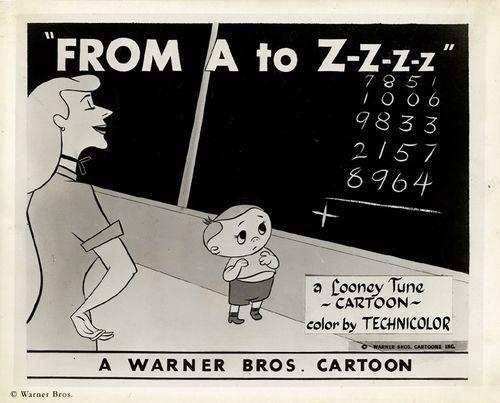A Year in Shorts Day 77: "From A to Z-Z-Z-Z"
When someone says Looney Tunes, who comes to mind? Probably Bugs Bunny or Daffy Duck, right? Maybe the Tasmanian Devil if you’re stuck in the 90s, or Tweetie Bird if you’re a horrible monster. But outside of the characters we all know and Warner Brothers loves to merchandise, there’s a deep bench of characters that often gets ignored. And among those characters is Ralph Phillips, star of today’s short, From A to Z-Z-Z-Z-.
Directed by Chuck Jones (who else, really?), From A to Z-Z-Z-Z is a 1953 short all about childhood boredom, which appears to be a theme with us lately. The child in this case is Ralph Phillips, who has a bad habit of daydreaming in class and going on various escapades in his mind. If you, like me, had an overactive imagination as a child (or if you're a fan of the hit sitcom Scrubs), you'll find a lot to like here.
While every short we'll be covering in our Year of Shorts is one I've seen prior to last November, I try my best to rewatch every short before writing a post about it. And From A to Z-Z-Z-Z is a great example as to why I do this. Prior to writing this post, my memories of this short were not positive ones. Watching it again, I can't really say why that was. It's not the best Looney Tunes short, certainly, but it's cute and a wonderful celebration of imagination. I wonder if Klasky-Csupo had this short in mind when they created Rugrats; there's definitely some DNA in common.
Perhaps part of my issue was with expectations. From A to Z-Z-Z-Z definitely does not fit the bill of what one expects from a Looney Tunes short. Honestly, if I didn't know better I'd assume it was a UPA short; it's definitely got the look and a lot of the humor wouldn't be out of place with Mr. Magoo. But the Looney Tunes had a lot more variety than people often give them credit for, and that's very much on display here. And as seemingly simple as the animation is, there are some fantastic visuals throughout, with Ralph's encounter in the chalkboard being a particular highlight.
Of course, this is a short from the 1950s, for better or worse. And while I definitely appreciate the stylistic choices on display here which were so common in that decade (especially in regards to character animation), I am less enamored with some of the racial stereotyping. Admittedly, it's not nearly as bad as other shorts we've covered, and one could make the argument that the film is simply showing the stereotypes a child like Ralph might believe rather than reflect any honest feelings on behalf of the filmmakers. Of course, one could also ask how a child picks up those stereotypes if not from media like cartoons? Besides the US educational system, of course.
While I'm glad I got to see From A to Z-Z-Z-Z again, it wasn't easy. I won't go into the details, but let's just say you'll have to be patient with your Google search if you want to view it. Once again, I have to ask why this short isn't available to watch on HBO Max. What is the point of having everything be owned by a handful of massive corporations if they're not even going to do anything with it?
But if you get the opportunity to watch this short, do check it out. It's pretty delightful, and yet another example of the style that made 1950s animation so uniquely charming. Here's to hoping Warner Brothers understands that they've got something worth sharing on their hands. From A to Z-Z-Z-Z would lose Best Animated Short to Toot, Whistle, Plunk and Boom, a short which I had much fonder feelings of before embarking on this journey. Just goes to show that you never can tell where you're going to land on these things!
Keep up with the Oscar Baiting here on Letterboxd!
The Great Oscar Baiter is a not-for-profit work of criticism. All images herein are property of their respective owners and are protected under Fair Use.




Comments
Post a Comment